We will stay firmly rooted in Chinese culture. We will collect and refine the defining symbols and best elements of Chinese culture and showcase them to the world. We will accelerate the development of China’s discourse and narrative systems, better tell China’s stories, make China’s voice heard, and present a China that is credible, appealing, and respectable.
習近平會見德國總理朔爾茨
發佈時間:2024-04-17 08:36:56 | 來源:新華社 | 作者: | 責任編輯:丁素雲新華社北京4月16日電(記者楊依軍)4月16日上午,國家主席習近平在北京釣魚臺國賓館會見德國總理朔爾茨。
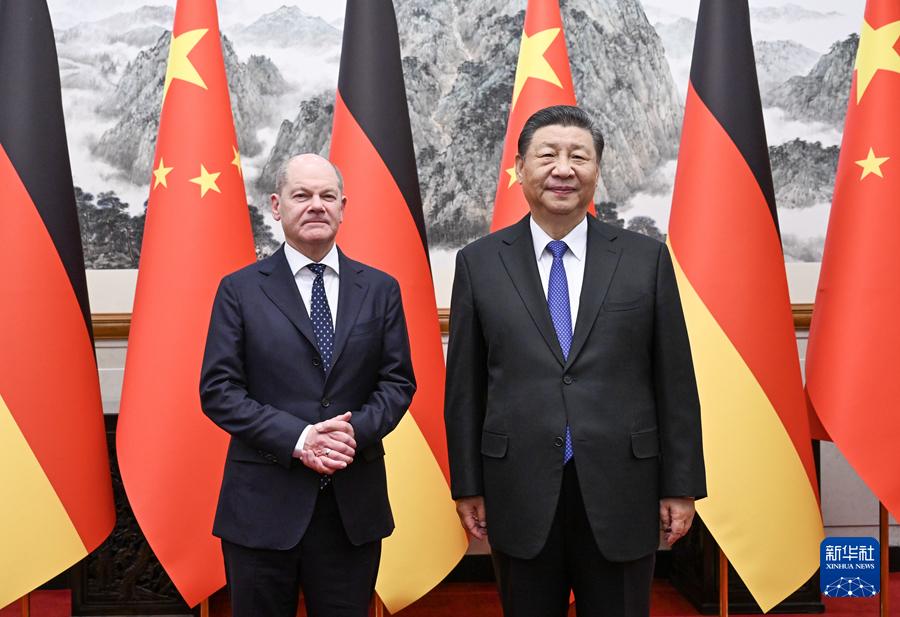
4月16日上午,國家主席習近平在北京釣魚臺國賓館會見德國總理朔爾茨。新華社記者 謝環馳 攝
習近平指出,今年是中德建立全方位戰略夥伴關係10週年。10年來,儘管國際形勢發生很大變化,但中德關係始終穩健發展,各領域合作不斷鞏固和深化,為兩國各自發展提供了動力。當前,世界百年變局加速演進,人類社會面臨的風險挑戰增多,要解決這些問題,離不開大國合作。中德是世界第二、第三大經濟體,鞏固和發展中德關係的意義超越雙邊關係範疇,對亞歐大陸乃至整個世界都有重要影響。兩國要從長遠和戰略角度看待和發展雙邊關係,攜手為世界注入更多穩定性和確定性。
習近平強調,中德兩國都曾為人類文明進步作出重大貢獻。中德之間沒有根本利益衝突,彼此不構成安全威脅。中德合作對雙方有利,對世界有利。世界越是動蕩,雙方越要提升兩國關係的韌性和活力,堅持中德關係的合作主基調和發展大方向,牢牢把握中德是全方位戰略夥伴這一定位。中國對德政策保持高度穩定性和連貫性。雙方應該繼續以開放的胸襟密切交往,增進戰略互信。只要雙方堅持相互尊重、求同存異、交流互鑒、合作共贏,兩國關係必將繼續行穩致遠。
習近平指出,中德産業鏈供應鏈深度互嵌,兩國市場高度依存。中德互利合作不是“風險”,而是雙方關係穩定的保障、開創未來的機遇。無論是機械製造、汽車等傳統領域,還是綠色轉型、數字化、人工智慧等新興領域,兩國都有合作共贏的巨大潛力亟待挖掘。雙方應該發揚互利共贏的鮮明特色,彼此成就。中國出口電動汽車、鋰電池、光伏産品等,不僅豐富了全球供給,緩解了全球通脹壓力,也為全球應對氣候變化和綠色低碳轉型作出巨大貢獻。中德兩國都是以實業立國,都支援自由貿易和經濟全球化。雙方要警惕保護主義抬頭,堅持以市場眼光和全球視野,從經濟規律出發,客觀、辯證看待産能問題,多探討合作。中國堅持對外開放基本國策,希望德方為中國企業赴德發展提供公平、透明、開放、非歧視的營商環境。中德在世界多極化問題上有不少共通之處。多極化本質上應該是不同文明、不同制度、不同道路的國家之間相互尊重、和平共處。中德應該獨立自主開展多邊領域協作,推動國際社會用實際行動更好應對氣候變化、發展不平衡、地區衝突等全球性挑戰,為世界的平衡穩定作出更多貢獻。

4月16日上午,國家主席習近平在北京釣魚臺國賓館會見德國總理朔爾茨。新華社記者 丁海濤 攝
朔爾茨表示,當前,德中關係發展良好,雙方各層級、各領域交往密切。雙方成功舉行了兩國政府磋商以及戰略、財金等領域高級別對話,還將舉行氣候變化和綠色轉型對話。過去兩天,我和德國企業界代表參訪了重慶、上海等地,親身感受到中國經濟發展近年來取得的巨大成就,對德中兩國企業界的緊密良好合作印象深刻。德方願同中方繼續加強兩國關係,深化各領域雙邊對話與合作,推進教育、文化等領域人文交流,這對德中兩國以及世界都至關重要。德方願同中方加強溝通協調,共同應對氣候變化等全球挑戰,致力於維護多邊國際秩序,促進世界和平與發展,不贊同對立對抗。德方反對保護主義,支援自由貿易。作為歐盟重要成員,德國願為促進歐盟同中國關係良好發展發揮積極作用。
兩國領導人還就烏克蘭危機深入交換意見,表示中德都致力於遵守聯合國憲章宗旨和原則,反對使用核武器或攻擊和平核設施,妥善解決國際糧食安全問題,遵守國際人道主義法。
習近平強調,當前形勢下,為防止衝突螺旋式升級甚至走向失控,各方應共同致力於早日恢復和平。為此,應該把握以下幾個原則:一要以和平穩定的大局為重,不要謀求一己私利。二要為局勢降溫,不要拱火澆油。三要為恢復和平積累條件,不要進一步激化矛盾。四要減少對世界經濟的負面影響,不要破壞全球産業鏈供應鏈穩定。中方不是烏克蘭危機的當事方、參與方,但一直在以自己的方式勸和促談。中方鼓勵和支援一切有利於和平解決危機的努力,支援適時召開俄烏雙方認可、各方平等參與、對所有和平方案進行公平討論的國際和會,願就此同包括德國在內的有關各方保持密切溝通。
雙方還就巴以衝突等共同關心的國際和地區問題交換了意見。雙方都認為,應落實聯合國安理會第2728號決議,防止事態擴大,避免局勢進一步惡化,保證加沙地帶無障礙、可持續的人道主義準入,支援巴勒斯坦問題在“兩國方案”基礎上早日通過談判解決,呼籲有影響力的國家為維護地區和平穩定發揮建設性作用,推動巴勒斯坦問題早日得到全面、公正、持久解決。

4月16日上午,國家主席習近平在北京釣魚臺國賓館會見德國總理朔爾茨。這是習近平同朔爾茨一起散步。新華社記者 丁海濤 攝
會見後,習近平同朔爾茨一起散步並共進午餐,就廣泛議題進一步深入交流。

4月16日上午,國家主席習近平在北京釣魚臺國賓館會見德國總理朔爾茨。這是習近平同朔爾茨合影。新華社記者 謝環馳 攝
王毅參加會見。
Xi meets German chancellor, calls for achieving mutual success
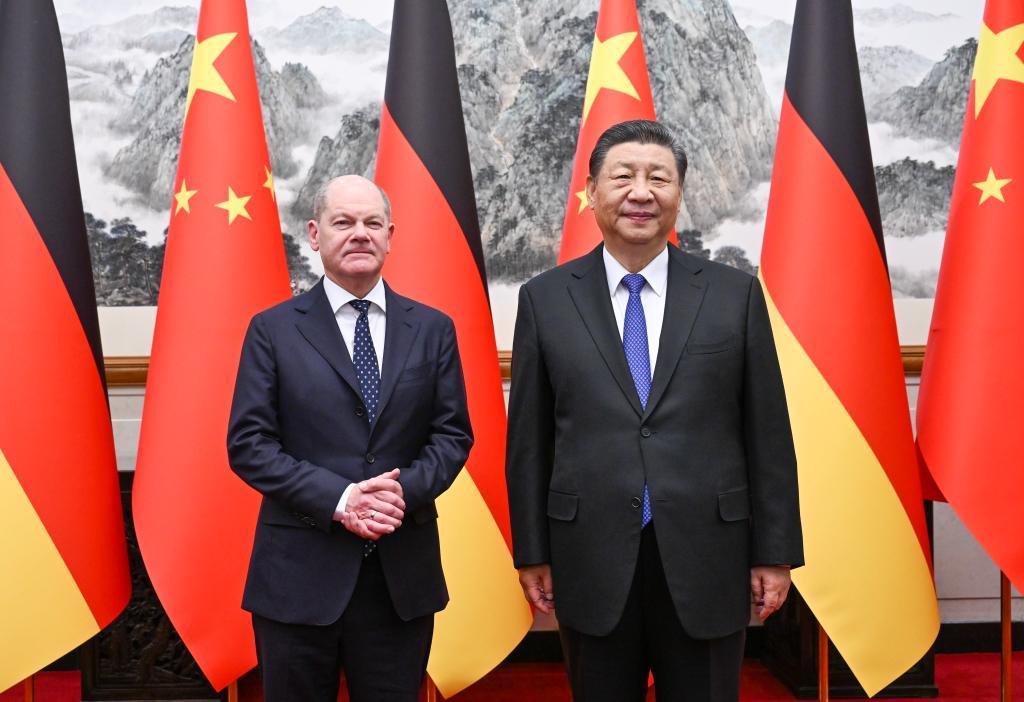
Chinese President Xi Jinping meets with German Chancellor Olaf Scholz at the Diaoyutai State Guesthouse in Beijing, capital of China, April 16, 2024. (Xinhua/Xie Huanchi)
BEIJING, April 16 (Xinhua) -- Chinese President Xi Jinping met with German Chancellor Olaf Scholz on Tuesday at the Diaoyutai State Guesthouse in Beijing, calling on the two sides to carry forward the distinctive characteristics of mutual benefit and win-win outcomes and achieve mutual success.
Noting that this year marks the 10th anniversary of the establishment of the all-round strategic partnership between China and Germany, Xi said over the past 10 years, despite tremendous changes in the international landscape, China-Germany relations have maintained steady growth, and bilateral cooperation has strengthened and deepened across the board, providing impetus for the development of both countries.
Currently, transformation not seen in a century is accelerating across the globe, and humanity faces growing risks and challenges. These problems can not be resolved without major-country cooperation, Xi said.
As China and Germany are respectively the second and third largest economies in the world, the consolidation and development of their relations carries significance that goes beyond the bilateral scope, and has a major impact on the Eurasian continent and the entire world, Xi said, calling on the two countries to view and develop bilateral relations from a long-term and strategic perspective, and work together to inject greater stability and certainty into the world.
He underscored that both China and Germany have made major contribution to the progress of human civilization. The two countries do not have clashing fundamental interests between them and pose no security threat to each other. Cooperation between China and Germany benefits not just the two sides but also the world at large.
The more instability in the world, the greater the need for the two sides to strengthen the resilience and vitality of their relations, Xi said, calling for joint efforts to keep to the overall direction of cooperation and development in growing bilateral ties, and stick to the characterization of all-round strategic partnership.
China's policy toward Germany is highly stable and consistent, Xi said, noting that the two sides need to continue engaging in close exchanges with an open mind and enhance strategic mutual trust. As long as the two sides uphold mutual respect, seek common ground while reserving differences, enhance exchanges and mutual learning, and pursue win-win cooperation, China-Germany relations will continue to enjoy solid and sustained progress.
Xi noted that the industrial and supply chains of China and Germany are deeply intertwined, and that the markets of the two countries are highly interdependent. Mutually beneficial cooperation between China and Germany is not a "risk," but the guarantee for a stable bilateral relationship and an opportunity for the future.
There is huge potential to be tapped for pursuing win-win cooperation in both traditional sectors such as machinery and automobile, and new areas such as green transition, digitization and artificial intelligence, Xi said.
It is important for the two sides to promote the win-win features of their relations and enable each other to succeed, Xi said, adding that China's export of electric vehicles, lithium batteries and photovoltaic products has not only enriched global supply and eased global inflationary pressure, but also made important contribution to the global response to climate change and the green and low-carbon transition.
Noting that both China and Germany are countries built on industries, and both support free trade and economic globalization, Xi said it is important for the two countries to stay vigilant against the rise of protectionism, adopt an objective and dialectical view on the issue of production capacity through a market and global perspective and based on the laws of economics, and devote more efforts to the discussion on cooperation.
China is committed to the basic national policy of opening up, and hopes that the German side can provide a fair, transparent, open and non-discriminatory business environment for Chinese enterprises in Germany, Xi said.
Underscoring that China and Germany share a lot in common on the issue of world multipolarity, Xi pointed out that a multipolar world is, in essence, one where countries with different civilizations, systems and paths respect each other and coexist in peace.
He said China and Germany need to independently carry out collaboration on multilateral fronts, push the international community to take real actions to better address global challenges such as climate change, unbalanced development and regional conflicts, and make greater contribution to the balance and stability of the world.
For his part, Scholz noted that Germany-China relations are now in good shape. The two countries have had close exchanges at all levels and in all fields. The two sides successfully held the intergovernmental consultation and high-level dialogues on strategic and financial issues, and will hold a dialogue on climate change and green transition.
In the past two days, he visited Chongqing and Shanghai together with representatives of the German business community, and witnessed the great economic progress China made over recent years, Scholz said. He added he was particularly impressed by the close and sound cooperation between German and Chinese businesses.
Going forward, the German side will work with the Chinese side to strengthen bilateral ties, deepen dialogue and cooperation in all fields, and promote people-to-people exchanges in such areas as education and culture, which is important for both countries and the world at large, he said.
The German side stands ready to enhance communication and coordination with the Chinese side to jointly tackle climate change and other global challenges, commits to upholding the multilateral international order and promoting world peace and development, and disapproves of conflict and confrontation, Scholz said, adding that Germany opposes protectionism and supports free trade.
As an important member of the European Union, Germany is ready to play a positive role in promoting the sound development of EU-China relations, Scholz said.
The two leaders also had an in-depth exchange of views on the Ukraine crisis, noting that both China and Germany stand committed to the purposes and principles of the UN Charter, oppose the use of nuclear weapons or attack on peaceful nuclear facilities, and call for efforts to properly address the issue of global food security and observe the international humanitarian law.
Xi underscored that under the current circumstances, all parties should commit to an early restoration of peace to prevent the conflict from escalating and even spiraling out of control.
To this end, a number of principles should be followed: first, focusing on the overall interest of peace and stability rather than seeking selfish gains; second, cooling down the situation rather than adding fuel to the fire; third, accumulating conditions for restoring peace rather than further aggravating tensions; and fourth, reducing the negative impact on the world economy rather than undermining the stability of global industrial and supply chains.
China is not a party to the Ukraine crisis, but has consistently promoted talks for peace in its own way, Xi said, China encourages and supports all efforts that are conducive to the peaceful resolution of the crisis, and supports the holding in due course of an international peace conference that is recognized by both Russia and Ukraine and ensures the equal participation of all parties and fair discussions on all peace plans.
China will maintain close communication with all parties concerned, including Germany, on this matter, Xi said.
The two sides also exchanged views on the Palestinian-Israeli conflict and other international and regional issues of mutual interest. The two sides shared the view that it is important to implement UNSC Resolution 2728, prevent escalation and further deterioration of the situation, ensure unhindered and sustained humanitarian access to Gaza, support the early settlement of the Palestinian question through negotiations on the basis of the two-State solution, and call on countries with influence to play a constructive role in maintaining regional peace and stability, with a view to achieving a comprehensive, just and lasting solution to the question of Palestine at an early date.
Following the meeting, Xi and Scholz took a walk and had lunch together, during which they further exchanged views on a wide range of issues.
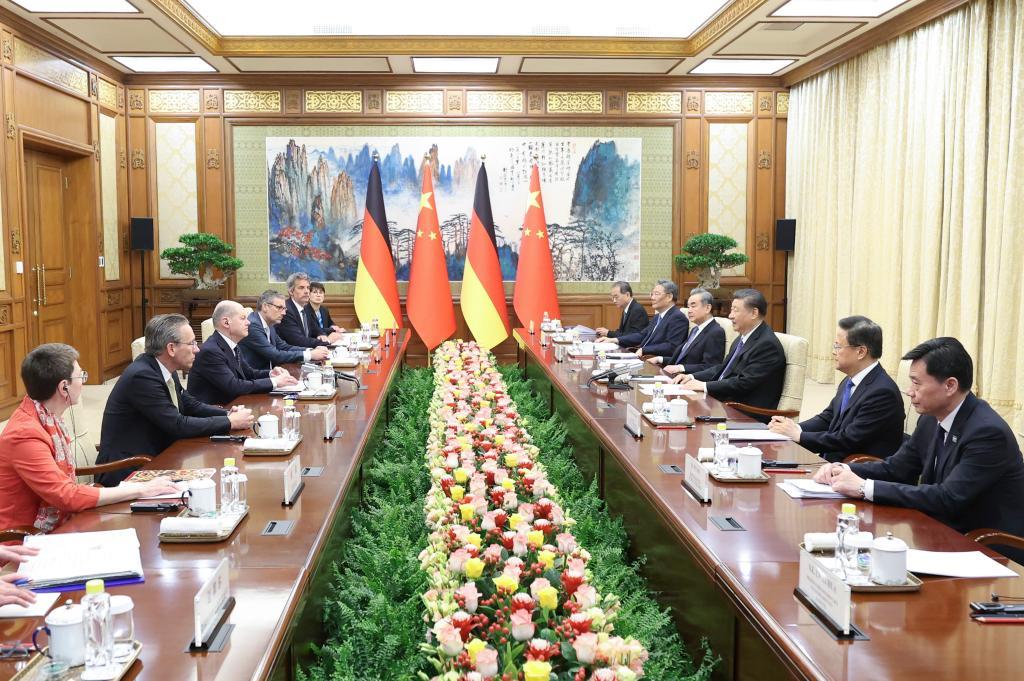
Chinese President Xi Jinping meets with German Chancellor Olaf Scholz at the Diaoyutai State Guesthouse in Beijing, capital of China, April 16, 2024. (Xinhua/Ding Haitao)
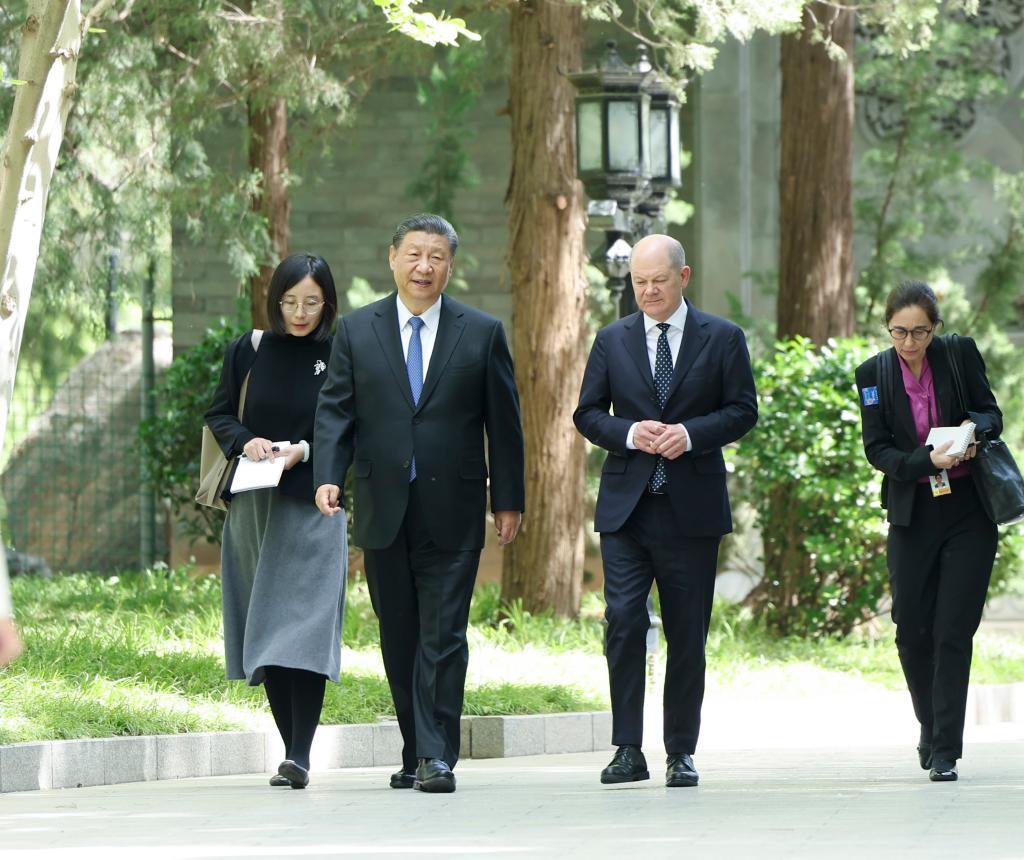
Chinese President Xi Jinping and German Chancellor Olaf Scholz take a walk in Beijing, capital of China, April 16, 2024. Xi met with German Chancellor Olaf Scholz at the Diaoyutai State Guesthouse in Beijing on Tuesday. (Xinhua/Ding Haitao)
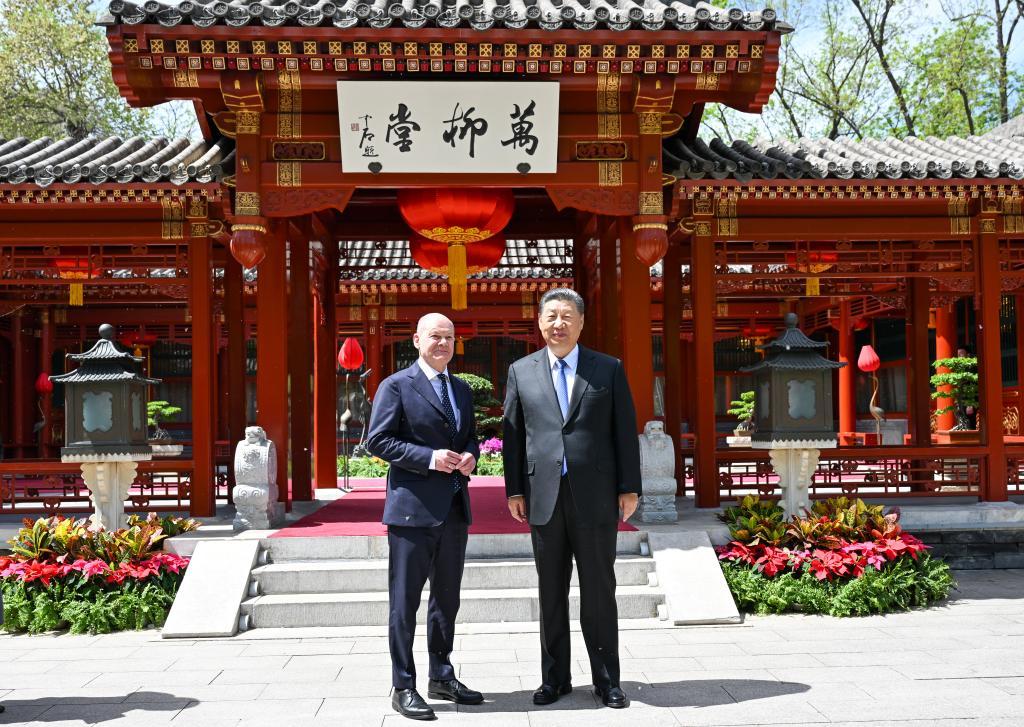
Chinese President Xi Jinping and German Chancellor Olaf Scholz pose for a photo in Beijing, capital of China, April 16, 2024. Xi met with German Chancellor Olaf Scholz at the Diaoyutai State Guesthouse in Beijing on Tuesday. (Xinhua/Xie Huanchi)

